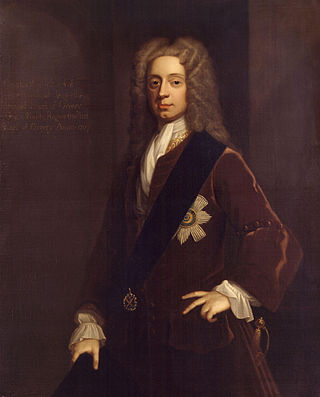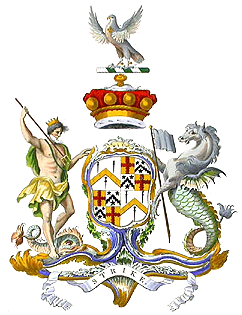
Ethan Green Hawke is an American actor and film director. He has been nominated for numerous accolades including four Academy Awards, two Golden Globe Awards and a Tony Award. Hawke has directed three feature films, three off-Broadway plays, and a documentary. He has also written three novels and one graphic novel. He made his film debut in Explorers (1985), before making a breakthrough performance in Dead Poets Society (1989). Hawke starred alongside Julie Delpy in Richard Linklater's Before trilogy: Before Sunrise (1995), Before Sunset (2004), and Before Midnight (2013). Hawke has received four Academy Award nominations, two for Best Supporting Actor for Training Day (2001) and Boyhood (2014) and the other two for Best Adapted Screenplay for co-writing Before Sunset and Before Midnight with Linklater and Delpy.

Earl of Sandwich is a noble title in the Peerage of England, held since its creation by the House of Montagu. It is nominally associated with Sandwich, Kent. It was created in 1660 for the prominent naval commander Admiral Sir Edward Montagu. He was made Baron Montagu of St Neots, of St Neots in the County of Huntingdon, and Viscount Hinchingbrooke, at the same time, also in the Peerage of England. The viscountcy is used as the courtesy title by the heir apparent to the earldom. A member of the prominent Montagu family, Lord Sandwich was the son of Sir Sidney Montagu, youngest brother of Henry Montagu, 1st Earl of Manchester, and Edward Montagu, 1st Baron Montagu of Boughton.

Edward Hawke, 1st Baron Hawke, KB, PC, of Scarthingwell Hall in the parish of Towton, near Tadcaster, Yorkshire, was a Royal Navy officer. As captain of the third-rate HMS Berwick, he took part in the Battle of Toulon in February 1744 during the War of the Austrian Succession. He also captured six ships of a French squadron in the Bay of Biscay in the Second Battle of Cape Finisterre in October 1747.

Earl of Orrery is a title in the Peerage of Ireland that has been united with the earldom of Cork since 1753. It was created in 1660 for the soldier, statesman and dramatist Roger Boyle, 1st Baron Boyle, third but eldest surviving son of Richard Boyle, 1st Earl of Cork. He had already been created Lord Boyle, Baron of Broghill, in the Peerage of Ireland in 1628. He was succeeded by his son, the second Earl. He represented County Cork in the Irish House of Commons and served as Vice-President of Munster. On his death, the titles passed to his eldest son, the third Earl. He represented East Grinstead in the English House of Commons. He was succeeded by his younger brother, the fourth Earl. He was a Lieutenant-General in the Army and a prominent diplomat. In 1711 he was created Baron Boyle of Marston, in the County of Somerset, in the Peerage of Great Britain. His son, the fifth Earl, succeeded his third cousin as fifth Earl of Cork in 1753. See the latter title for further history of the peerages.

Earl Erne, of Crom Castle in the County of Fermanagh, is a title in the Peerage of Ireland. It was created in 1789 for John Creighton, 2nd Baron Erne, who had earlier represented Lifford in the Irish House of Commons. He had already been made Viscount Erne, of Crom Castle in the County of Fermanagh, in 1781, also in the Peerage of Ireland, and sat from 1800 to 1828 as an Irish Representative Peer in the British House of Lords. The title of Baron Erne, of Crom Castle in the County of Fermanagh, was created in the Peerage of Ireland in 1768 for his father Abraham Creighton. The Earl was succeeded by his eldest son, the second Earl. On his death the titles passed to his nephew, the third Earl. He was an Irish Representative Peer from 1845 to 1885 and also served as Lord Lieutenant of County Fermanagh during the same period. In 1876 he was created Baron Fermanagh, of Lisnaskea in the County of Fermanagh, in the Peerage of the United Kingdom. This was to allow the Earls to sit in the House of Lords by right, rather than having to stand for election as Representative Peers. An earlier title of Baroness Fermanagh in the Peerage of Ireland was created for Mary Verney on 13 June 1792, but became extinct on her death on 15 November 1810.

Baron Manners, of Foston in the County of Lincoln, is a title in the Peerage of the United Kingdom. It was created in 1807 for the lawyer and politician Sir Thomas Manners-Sutton. He served as Solicitor-General from 1802 to 1805 and as Lord Chancellor of Ireland from 1807 to 1827. Manners-Sutton was the fifth son of Lord George Manners-Sutton, third son of John Manners, 3rd Duke of Rutland. His elder brother Charles Manners-Sutton was Archbishop of Canterbury from 1805 to 1828 and the father of Charles Manners-Sutton, 1st Viscount Canterbury, Speaker of the House of Commons from 1817 to 1834. The first Baron's great-grandson, the fourth Baron, assumed the surname of Manners only. As of 2010 the title is held by the latter's grandson, the sixth Baron, who succeeded his father in 2008.
Viscount Camrose, of Hackwood Park in the County of Hampshire, is a title in the Peerage of the United Kingdom. It was created on 20 January 1941 for the prominent newspaper magnate William Berry, 1st Baron Camrose. He had previously received the award of Baronet, of Long Cross in the County of Surrey, in the Baronetage of the United Kingdom, on 4 July 1921, and was created Baron Camrose, of Long Cross in the County of Surrey, on 19 June 1929, in the Peerage of the United Kingdom. His second son, the third Viscount, disclaimed the peerages in 1995 on succeeding his elder brother. However, he had already been created a life peer as Baron Hartwell, of Peterborough Court in the City of London, on 19 January 1968. On his death in 2001 the life peerage became extinct while he was succeeded in the other titles by his eldest son, the fourth Viscount. The first three Viscounts all headed The Daily Telegraph at one point, the first having purchased it from Harry Levy-Lawson, 1st Viscount Burnham, but in the 1980s they lost control to Conrad Black.

Viscount St Davids, of Lydstep Haven in the County of Pembroke, is a title in the Peerage of the United Kingdom. It was created in 1918 for John Philipps, 1st Baron St Davids. The Philipps family descends from Sir John Philipps, who represented Pembrokeshire in the House of Commons. In 1621 he was created a Baronet, of Picton Castle in the County of Pembroke, in the Baronetage of England. His grandson, the third Baronet, also sat as Member of Parliament for Pembrokeshire. He was succeeded by his son, the fourth Baronet. He represented Pembroke and Haverfordwest in Parliament. His son, the fifth Baronet, sat for Haverfordwest. He was succeeded by his younger brother, the sixth Baronet. He represented Carmarthen, Petersfield and Pembrokeshire in the House of Commons.

Baron Hawke, "of Towton" in the County of York, is a title in the Peerage of Great Britain. It was created on 20 May 1776 for the admiral Sir Edward Hawke, responsible for a blockade of all French merchant shipping and the grounding of six French ships, and scattering of the rest, at the Battle of Quiberon Bay. The battle followed an earlier British victory at the Battle of Lagos off Portugal by a fleet under another Admiral's command.

Baron Harris, of Seringapatam and Mysore in the East Indies and of Belmont in the County of Kent, is a title in the Peerage of the United Kingdom.
Baron Hothfield, of Hothfield in the County of Kent, is a title in the Peerage of the United Kingdom. It was created in 1881 for Sir Henry Tufton, 2nd Baronet, who was appointed Lord Lieutenant of Westmorland the same year and who also served briefly as a government whip in the Liberal administration of 1886. His eldest son, the second Baron, notably served as Mayor of Appleby, Westmorland. On the death of his son, the third Baron, in 1961, this line of the family failed. The late Baron was succeeded by his first cousin, the fourth Baron. He was the only son of the Hon. Sackville Philip Tufton, second son of the first Baron. On his death in 1986 this line of the family also failed and the titles passed to his first cousin, the fifth Baron. He was the eldest son of the Hon. Charles Henry Tufton, third son of the first Baron. As of 2017 the titles are held by his son, the sixth Baron, who succeeded in 1991.

Baron Ashburton, of Ashburton in the County of Devon, is a title that has been created twice, once in the Peerage of Great Britain and once in the Peerage of the United Kingdom. Since 1835, the title has been held by members of the Baring family.

Baron Chesham, of Chesham in the County of Buckingham, is a title in the Peerage of the United Kingdom created in 1858 for the Hon. Charles Cavendish, who had earlier represented Aylesbury, Newtown, East Sussex, Youghal and Buckinghamshire in the House of Commons as a Liberal.

Baron Ravensdale, of Ravensdale in the County of Derby, is a title in the Peerage of the United Kingdom.
Professor Christopher Richard James Woodhouse, 6th Baron Terrington, is a British peer and a senior urologist.

Alastair John Lyndhurst Bruce, 5th Baron Aberdare,, is a British nobleman, and since 2009 a crossbench hereditary Lord Temporal.
Edmund James Burke Roche, 5th Baron Fermoy, was a British businessman who held a title in the Peerage of Ireland. He was the maternal uncle of Diana, Princess of Wales.
Bladen Wilmer Hawke, 9th Baron Hawke, was a British Conservative politician. He was the eldest son of Edward Julian Hawke, 8th Baron Hawke, whom he succeeded as 9th Baron Hawke in 1939. His uncle had been Martin Hawke, 7th Baron Hawke, who died in 1938. Hawke's mother was Lady Frances Alice Hawke, daughter of Colonel John Randal Wilmer.
Peers of the Realm have been associated with Australia since early in its history as a British settlement. Many peers served as governors of the Australian colonies, and in the days when the practice of appointing British governors-general was current, the great majority were peers.
Sir John Ramsden, 4th Baronet was an English landowner and Member of Parliament.












